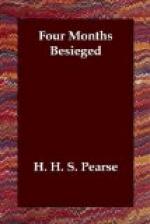There was to-day a solemn service of thanksgiving in the English Church. A Te Deum was impressively sung,—Sir George White and his Staff, at the Archdeacon’s invitation, standing at the altar rails,—and was followed by “God Save the Queen.”
January 8.—Sir Redvers Buller heliographed, congratulating Sir George White on the gallant defence of Ladysmith by this force, giving especial praise to the Devons for their behaviour, but making no mention of the Imperial Light Horse. An unfortunate omission.
CHAPTER XI
WATCHING FOR BULLER
Sir Redvers Buller’s second attempt—A message from the Queen—Last sad farewells—Burial of Steevens and Lord Ava—At dead of night—Relief army north of the Tugela—Water difficulties surmised—A look in at Bulwaan—Spion Kop from afar—What the watchers saw—The Boers trekking—Buller withdraws—The “key” thrown away—Good-bye to luxuries—Precautions against disease—“Chevril”—The damming of the Klip—Horseflesh unabashed—One touch of pathos—Vague memories of home—Sweet music from the south—Buller tries again—Disillusionment—The last pipe of tobacco.
Whatever may have been the precise cost to the Boers of their bold attempt to rush the British defences on 6th January, it was certainly heavy enough to prevent its being renewed. From this time forward they settled themselves resignedly to wait until disease and starvation in the town should have done for them what their best and bravest had failed to do, man against man. And, indeed, disease following upon many long weeks of privation, of nights and days passed in the trenches under drenching rain, or the fierce rays of the African sun, began now to make havoc among the troops. Many a brave fellow, who had fought and won at Dundee or at Elandslaagte, who with fierce, courage had endured in the foremost line in the struggle at Bester’s Ridge, now fell a victim to enteric fever or dysentery in the camp at Intombi. The lists of the sick and the mortality returns grew daily more formidable, rations soon had to be reduced, and all within the town, patient as had been their endurance, now began to look eagerly towards the relief that Sir Redvers Buller had promised in a month. As the time approached at which his second attempt to force the Tugela might be expected, hope revived. The relieving column, it was known, had been reinforced, and it seemed impossible that the enemy could once again bar its progress.
During the fierce fighting at Ladysmith there were times when Sir George White had grave fears that he would not be longer able to hold the defences against the enemy. The fortunes of the day, as the hours lengthened, were reflected in a series of telegrams which were flashed through by him to Sir Redvers Buller in his camp south of the Tugela. One of these brief heliograms reported




